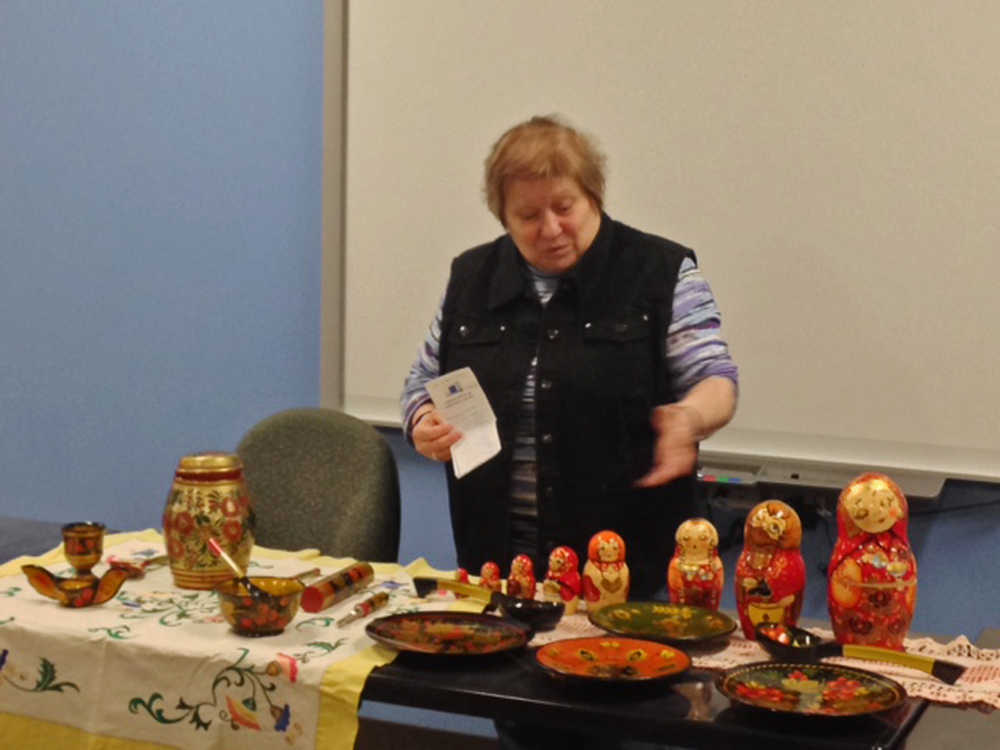Though her English is heavily accented and she sometimes flounders for a word, it would be hard to say Natasha Weissenberg doesn’t communicate.
Gathered at a table in Kenai Peninsula College’s Learning Center, a group of about a dozen students watched as she spread out pieces of art from her native Moldova, a small country between Ukraine and Romania that was part of the former Union of Soviet Socialist Republics. Afterward, explaining what she was showing, she searched for the English word for “matryoshka”— nesting dolls. The one she had shown had 10 dolls inside of it, she said.
Weissenberg came to the U.S. 17 years ago but only started coming to Kenai Peninsula College’s English as a Second Language classes about two years ago. Fluent in Russian and Romanian with some knowledge of German, she managed to learn some English. A friend helped her translate parts of her Bible, pointing out the differences in names — for instance, she knew the name “Jacob” as “Yakov.” It was frustrating not to be able to communicate, she said.
“You feel so stupid,” she said. “…I have languages. I taught piano and college in Moldova.”
In fact, many of the people in the class are college-educated immigrants to the U.S. Jaeey Laber, who came to Alaska from Thailand in 2011, took English classes when she lived there but was only able to read and write. When she met her husband, an American, they communicated by writing back and forth, she said. She still keeps paper on her in case she has to write something out.
English is a challenging language. It’s not strictly a Romance language like Spanish or Italian, and it’s not strictly a Germanic or Slavic language. There are subtle nuances in the way speakers use their tongues to change the pronunciation and thus meaning of a word that other languages don’t have. A January 2000 study from the Stanford University found that oral proficiency in English took three to five years to develop, while academic proficiency took four to seven years. Laber said when she was learning English, she didn’t learn to stress parts of words, which made it difficult later.
People speak very quickly in America and don’t enunciate their words, she said. To pick up on the way people speak, she often watches their lips, but some people mumble and don’t move their lips much, she said. Sometimes, when she’s ordering coffee at a shop, she waits for several people to go ahead of her and listens to what they order and how they pronounce it, like the word “ice.”
The English as a Second Language group at Kenai Peninsula College provides a place for community members who want to improve their English to come and practice it. Free and open to anyone, the college has been operating the program for more than two decades and this year expanded the offerings to include a wider variety of topics.
Beyond just language classes, students can now take a citizenship and U.S. history class or a newspaper class. They can jump into a conversation group on Thursdays where the students can talk about anything from electric bills to U.S. politics or take part in a book club where the participants are reading “Gold Rush Women,” a collection of stories about women who came north during the Gold Rush.
Bridget Clark, one of the instructors and coordinator for the ESL program, said the goal was to make the class offerings more oriented for career readiness and practical English conversations.
“This year, our director really wanted us to be more focuses in our programming,” she said. “…We really make the courses in line with what the college would be offering.”
The program uses an established curriculum, but the teachers supplement it, Clark said. For example, in one of the recent conversation groups, a student brought up concerns about the icy roads and the class ended up going into an unplanned conversation throughout the hour-long group. But even that was constructive, she said.
“…The first ice storm we had, we were going over all the words for skidding and slipping and black ice and Alaska 511, so in a lot of the group, we take our cues from things that have happened, what everybody wants to talk about,” she said.
About 25 people take part in the program, but that number fluctuates and isn’t always evident — new student can enroll any time by coming to the Learning Studio, and some of the students don’t come to class, Clark said. The program accommodates them by sending tutors out to meet the students and help them, she said.
The English as a Second Language program is part of the Adult Basic Education program, which offers free classes in a variety of subjects from math, reading, writing and spelling as well as preparing students for GED exams. Many of the students in the ESL program were professionals before immigrating to the U.S. and have aspirations to practice in the U.S., but they have to become proficient enough in English to pass the exams to qualify to practice, Clark said.
Multiple languages of different background are represented in the program, some of which have multiple speakers. At the end of the conversation group Thursday, two of the participants spoke softly to one another in Russian. Other members of the group speak Spanish. A couple that came recently to the U.S. from Ukraine attends the group conversations, Clark said.
“They bring the common experience of coming to the United States, of coming here and struggling with the language, and they can tell you all kinds of stories about fumbling over language, where they’ve had trouble, funny things that have happened,” she said. “They form a really tight community bond and support system for each other because this is a safe place and we can laugh about pronunciation and we can laugh about silly things.”
Reach Elizabeth Earl at elizabeth.earl@peninsulaclarion.com.

